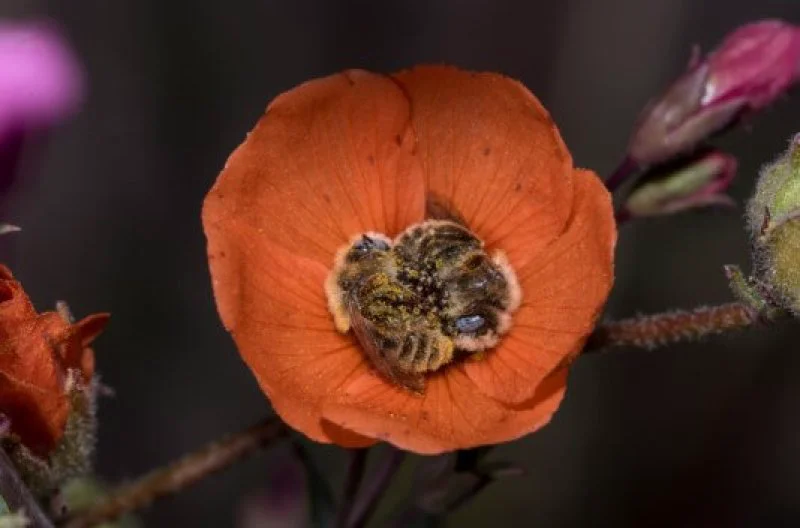Glyphosate does not kill bumble bees and is unlikely to cause health problems, latest comprehensive study finds
Glyphosate does not kill bumble bees and is unlikely to cause health problems, latest comprehensive study finds


Glyphosate is the most commonly used herbicide in the world, and is widely used in agriculture. While glyphosate has been deemed ‘bee-safe’ by regulators, some emerging evidence studies suggest that it has negative effects on bees. For that reason, discovering whether glyphosate alone, or in combination with other stressors, is detrimental to bee health, has become a question of great importance.
A new study by authors Edward Straw and Prof. Mark Brown of Royal Holloway University of London (RHUL) expands the current knowledge on glyphosate.
It examines the impact of glyphosate on a previously untested species, the buff-tailed bumble bee, Bombus terrestris, and incorporates a bee parasite, Crithidia bombi, that has never before been tested alongside glyphosate.
By using several different research methods from the field of ecotoxicology, the authors observed that there was no significant effect on bee mortality when bees were exposed to glyphosate, the bee parasite, or both stressors together. In addition, no significant effect was observed for reproduction or sucrose consumption.
The findings provide solid evidence that oral exposure to glyphosate does not cause mortality in bumble bees. Inconclusive evidence was found as to whether glyphosate made parasite infections more intense, but either way this is unlikely to be relevant at environmentally realistic concentrations.
Because the research finds no effects of glyphosate, the parasite, or their combination on any measurement of health, the results do not indicate any requirement to change the regulatory status of the active ingredient glyphosate as it pertains to bumble bees.
Despite the fact that the results find that glyphosate is unlikely to be harmful to bumble bees either alone, or alongside a common parasite, previous work found that it may have a negative impact on honey bees. For that reason, the authors of the article advise that further research on wild bee species and sublethal metrics would be useful to assist in resolving whether this widely used chemical is safe for bees.
Edward Straw says “Glyphosate is a very polarizing chemical, with scientists divided over whether it’s safe or not. As such, it’s important that decisions about whether to restrict its usage are made based on rigorous science. Our findings are strong evidence that glyphosate alone is not causing mortality in bumble bees.”
“As an incredibly important and useful herbicide we need more evidence from a wider range of species, exposures, and methodologies to determine if glyphosate is safe, so it can be used with confidence. Tests on the active ingredient (glyphosate) alone aren’t enough because prior work has found the other ingredients used in the herbicide products can be dangerous to bees.”
Read the full post here.

 | Videos | More... |

Video: Nuclear energy will destroy us? Global warming is an existential threat? Chemicals are massacring bees? Donate to the Green Industrial Complex!
 | Bees & Pollinators | More... |

GLP podcast: Science journalism is a mess. Here’s how to fix it

Mosquito massacre: Can we safely tackle malaria with a CRISPR gene drive?

Are we facing an ‘Insect Apocalypse’ caused by ‘intensive, industrial’ farming and agricultural chemicals? The media say yes; Science says ‘no’
 | Infographics | More... |

Infographic: Global regulatory and health research agencies on whether glyphosate causes cancer
 | GMO FAQs | More... |

Why is there controversy over GMO foods but not GMO drugs?

How are GMOs labeled around the world?

How does genetic engineering differ from conventional breeding?
 | GLP Profiles | More... |

Alex Jones: Right-wing conspiracy theorist stokes fear of GMOs, pesticides to sell ‘health supplements’




 Viewpoint — Fact checking MAHA mythmakers: How wellness influencers and RFK, Jr. undermine American science and health
Viewpoint — Fact checking MAHA mythmakers: How wellness influencers and RFK, Jr. undermine American science and health Viewpoint: Video — Big Solar is gobbling up productive agricultural land and hurting farmers yet providing little energy or sustainabilty gains
Viewpoint: Video — Big Solar is gobbling up productive agricultural land and hurting farmers yet providing little energy or sustainabilty gains Trust issues: What happens when therapists use ChatGPT?
Trust issues: What happens when therapists use ChatGPT? Fighting deforestation with CO2: Biotechnology breakthrough creates sustainable palm oil alternative for cosmetics
Fighting deforestation with CO2: Biotechnology breakthrough creates sustainable palm oil alternative for cosmetics California, Washington, Oregon forge immunization alliance to safeguard vaccine access against federal undermining
California, Washington, Oregon forge immunization alliance to safeguard vaccine access against federal undermining 30-year-old tomato line shows genetic resistance to devastating virus
30-year-old tomato line shows genetic resistance to devastating virus The free-range chicken dilemma: Better for birds, but with substantial costs
The free-range chicken dilemma: Better for birds, but with substantial costs ‘You have to treat the brain first’: Rethinking chronic pain with Sanjay Gupta
‘You have to treat the brain first’: Rethinking chronic pain with Sanjay Gupta
